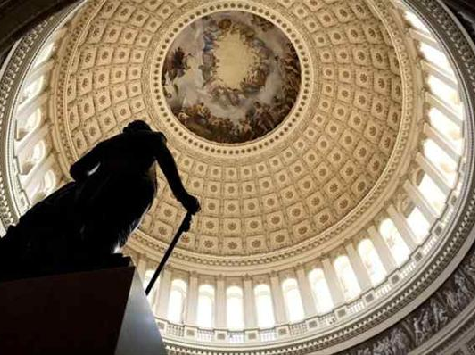
Last week, the House and Senate passed a bill that would gut a key provision of the popular STOCK (Stop Trading On Congressional Knowledge) Act that bans congressional insider trading and increases financial transparency for lawmakers, members of the executive branch, and their staffs.
The bill passed last week strikes down the STOCK Act’s requirement that financial records of some 28,000 federal officials–which are already publicly available in paper form–be made available online via searchable databases. Government watchdog groups say this provision would have increased transparency and helped root out potential financial conflicts of interest and cronyism in government deals, grants, and contracts.
Federal workers fiercely opposed the transparency measure. In a dramatic letter, a bipartisan roster of former senior federal officials warned that making records that are already public record accessible in a digitized, searchable format posed a dangerous threat to national security that could be a “jackpot” for “enemies of the United States intent on finding security vulnerabilities they can exploit.”
Government watchdog groups slammed the gutting of the STOCK Act, claiming the reversal of the act was based on scaremongering and was an effort by Washington insiders to protect one another and keep taxpayers in the dark.
“Continuing to obscure the contents of these reports by eliminating the database requirements is unnecessary and uncalled for,” said Dan Auble of the Center for Responsive Politics. “The filings of federal employees are and for many years have been available as part of the public record.”
“In this day and age, publicly disclosed should mean available online,” he reasoned.
Lisa Rosenberg of the Sunlight Foundation agreed: “Security through obscurity as a justification to repeal the transparency provisions of the STOCK Act starts us down a slippery slope where any government action or information could be taken offline in the name of safety.”
Overwhelming bipartisan support for the STOCK Act emerged in 2011 after the publication of the book Throw Them All Out by Government Accountability Institute President Peter Schweizer revealed that members of Congress were using nonpublic information to enrich themselves.
Schweizer’s book prompted a 60 Minutes investigation that produced an explosive exchange between CBS veteran reporter Steve Kroft and Rep. Nancy Pelosi (D-CA) over a Visa IPO she and her husband gained access to. The investment helped the Pelosis bag a 203% rate of return on a $1 million to $5 million purchase of Visa stock (politicians are required to report investments in ranges, not exact amounts).
Pelosi denied any wrongdoing in the deal.

COMMENTS
Please let us know if you're having issues with commenting.